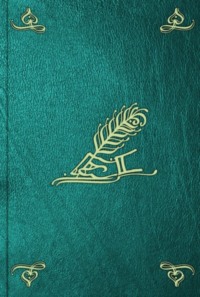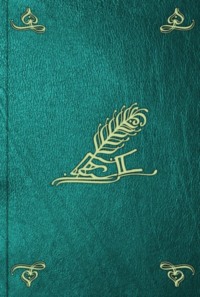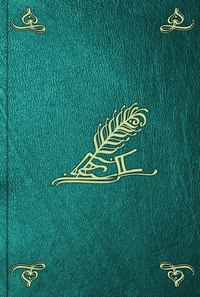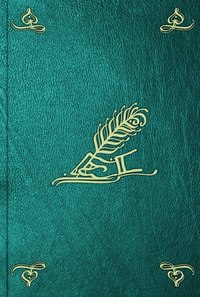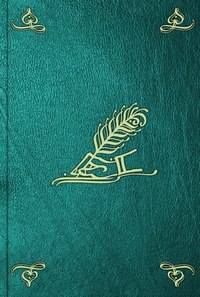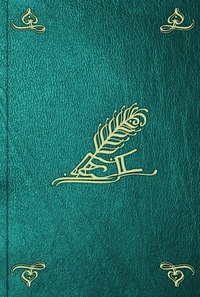 полная версия
полная версияCharles Darwin: His Life Told in an Autobiographical Chapter, and in a Selected Series of His Published Letters
I am glad to hear that you have been attending to birds' nests. I have done so, though almost exclusively under one point of view, viz. to show that instincts vary, so that selection could work on and improve them. Few other instincts, so to speak, can be preserved in a Museum.
Many thanks for your offer to look after horses' stripes; if there are any donkeys, pray add them. I am delighted to hear that you have collected bees' combs… This is an especial hobby of mine, and I think I can throw a light on the subject. If you can collect duplicates at no very great expense, I should be glad of some specimens for myself with some bees of each kind. Young, growing, and irregular combs, and those which have not had pupæ, are most valuable for measurements and examination. Their edges should be well protected against abrasion.
Every one whom I have seen has thought your paper very well written and interesting. It puts my extracts (written in 1839,153 now just twenty years ago!), which I must say in apology were never for an instant intended for publication, into the shade.
You ask about Lyell's frame of mind. I think he is somewhat staggered, but does not give in, and speaks with horror, often to me, of what a thing it would be, and what a job it would be for the next edition of The Principles, if he were "perverted." But he is most candid and honest, and I think will end by being perverted. Dr. Hooker has become almost as heterodox as you or I, and I look at Hooker as by far the most capable judge in Europe.
Most cordially do I wish you health and entire success in all your pursuits, and, God knows, if admirable zeal and energy deserve success, most amply do you deserve it. I look at my own career as nearly run out. If I can publish my Abstract and perhaps my greater work on the same subject, I shall look at my course as done.
Believe me, my dear Sir, yours very sincerelyIn March 1859 the work was telling heavily on him. He wrote to Fox: —
"I can see daylight through my work, and am now finally correcting my chapters for the press; and I hope in a month or six weeks to have proof-sheets. I am weary of my work. It is a very odd thing that I have no sensation that I overwork my brain; but facts compel me to conclude that my brain was never formed for much thinking. We are resolved to go for two or three months, when I have finished, to Ilkley, or some such place, to see if I can anyhow give my health a good start, for it certainly has been wretched of late, and has incapacitated me for everything. You do me injustice when you think that I work for fame; I value it to a certain extent; but, if I know myself, I work from a sort of instinct to try to make out truth."
C. D. to C. Lyell. Down, March 28th [1859]My dear Lyell, – If I keep decently well, I hope to be able to go to press with my volume early in May. This being so, I want much to beg a little advice from you. From an expression in Lady Lyell's note, I fancy that you have spoken to Murray. Is it so? And is he willing to publish my Abstract?154 If you will tell me whether anything, and what has passed, I will then write to him. Does he know at all of the subject of the book? Secondly, can you advise me whether I had better state what terms of publication I should prefer, or first ask him to propose terms? And what do you think would be fair terms for an edition? Share profits, or what?
Lastly, will you be so very kind as to look at the enclosed title and give me your opinion and any criticisms; you must remember that, if I have health, and it appears worth doing, I have a much larger and full book on the same subject nearly ready.
My Abstract will be about five hundred pages of the size of your first edition of the Elements of Geology.
Pray forgive me troubling you with the above queries; and you shall have no more trouble on the subject. I hope the world goes well with you, and that you are getting on with your various works.
I am working very hard for me, and long to finish and be free and try to recover some health.
My dear Lyell, ever yoursP.S. – Would you advise me to tell Murray that my book is not more un-orthodox than the subject makes inevitable. That I do not discuss the origin of man. That I do not bring in any discussion about Genesis, &c. &c., and only give facts, and such conclusions from them as seem to me fair.
Or had I better say nothing to Murray, and assume that he cannot object to this much unorthodoxy, which in fact is not more than any Geological Treatise which runs slap counter to Genesis.
Enclosure.
AN ABSTRACT OF AN ESSAYON THEORIGINOFSPECIES AND VARIETIESTHROUGH NATURAL SELECTIONBYCharles Darwin, M.AFELLOW OF THE ROYAL, GEOLOGICAL, AND LINNEAN SOCIETIES—LONDON:&c. &c. &c. &c1859 C. D. to C. Lyell. Down, March 30th [1859]My dear Lyell, – You have been uncommonly kind in all you have done. You not only have saved me much trouble and some anxiety, but have done all incomparably better than I could have done it. I am much pleased at all you say about Murray. I will write either to-day or to-morrow to him, and will send shortly a large bundle of MS., but unfortunately I cannot for a week, as the first three chapters are in the copyists' hands.
I am sorry about Murray objecting to the term Abstract, as I look at it as the only possible apology for not giving references and facts in full, but I will defer to him and you. I am also sorry about the term "natural selection." I hope to retain it with explanation somewhat as thus: —
"Through natural selection, or the preservation of favoured races."
Why I like the term is that it is constantly used in all works on breeding, and I am surprised that it is not familiar to Murray; but I have so long studied such works that I have ceased to be a competent judge.
I again most truly and cordially thank you for your really valuable assistance.
Yours most truly C. D. to J. D. Hooker. Down, April 2nd [1859]… I wrote to him [Mr. Murray] and gave him the headings of the chapters, and told him he could not have the MS. for ten days or so; and this morning I received a letter, offering me handsome terms, and agreeing to publish without seeing the MS.! So he is eager enough; I think I should have been cautious, anyhow, but, owing to your letter, I told him most explicitly that I accept his offer solely on condition that, after he has seen part or all the MS. he has full power of retracting. You will think me presumptuous, but I think my book will be popular to a certain extent (enough to ensure [against] heavy loss) amongst scientific and semi-scientific men; why I think so is, because I have found in conversation so great and surprising an interest amongst such men, and some 0-scientific [non-scientific] men on this subject, and all my chapters are not nearly so dry and dull as that which you have read on geographical distribution. Anyhow, Murray ought to be the best judge, and if he chooses to publish it, I think I may wash my hands of all responsibility. I am sure my friends, i. e. Lyell and you, have been extraordinarily kind in troubling yourselves on the matter.
I shall be delighted to see you the day before Good Friday; there would be one advantage for you in any other day – as I believe both my boys come home on that day – and it would be almost impossible that I could send the carriage for you. There will, I believe, be some relations in the house – but I hope you will not care for that, as we shall easily get as much talking as my imbecile state allows. I shall deeply enjoy seeing you.
… I am tired, so no more.
P.S. – Please to send, well tied up with strong string, my Geographical MS. towards the latter half of next week —i. e. 7th or 8th – that I may send it with more to Murray; and God help him if he tries to read it.
… I cannot help a little doubting whether Lyell would take much pains to induce Murray to publish my book; this was not done at my request, and it rather grates against my pride.
I know that Lyell has been infinitely kind about my affair, but your dashed [i. e. underlined] "induce" gives the idea that Lyell had unfairly urged Murray.
C. D. to J. Murray. Down, April 6th [1859]My dear Sir, – I send by this post, the Title (with some remarks on a separate page), and the first three chapters. If you have patience to read all Chapter I., I honestly think you will have a fair notion of the interest of the whole book. It may be conceit, but I believe the subject will interest the public, and I am sure that the views are original. If you think otherwise, I must repeat my request that you will freely reject my work; and though I shall be a little disappointed, I shall be in no way injured.
If you choose to read Chapters II. and III., you will have a dull and rather abstruse chapter, and a plain and interesting one, in my opinion.
As soon as you have done with the MS., please to send it by careful messenger, and plainly directed, to Miss G. Tollett,155 14, Queen Anne Street, Cavendish Square.
This lady, being an excellent judge of style, is going to look out for errors for me.
You must take your own time, but the sooner you finish, the sooner she will, and the sooner I shall get to press, which I so earnestly wish.
I presume you will wish to see Chapter IV.,156 the key-stone of my arch, and Chapters X. and XI., but please to inform me on this head.
My dear Sir, yours sincerelyOn April 11th he wrote to Hooker: —
"I write one line to say that I heard from Murray yesterday, and he says he has read the first three chapters of [my] MS. (and this includes a very dull one), and he abides by his offer. Hence he does not want more MS., and you can send my Geographical chapter when it pleases you."
Part of the MS. seems to have been lost on its way back to my father. He wrote (April 14) to Sir J. D. Hooker: —
"I have the old MS., otherwise the loss would have killed me! The worst is now that it will cause delay in getting to press, and far worst of all, I lose all advantage of your having looked over my chapter,157 except the third part returned. I am very sorry Mrs. Hooker took the trouble of copying the two pages."
C. D. to J. D. Hooker. [April or May, 1859.]… Please do not say to any one that I thought my book on species would be fairly popular, and have a fairly remunerative sale (which was the height of my ambition), for if it prove a dead failure, it would make me the more ridiculous.
I enclose a criticism, a taste of the future —
Rev. S. Haughton's Address to the Geological Society, Dublin. 158
"This speculation of Messrs. Darwin and Wallace would not be worthy of notice were it not for the weight of authority of the names (i. e. Lyell's and yours), under whose auspices it has been brought forward. If it means what it says, it is a truism; if it means anything more, it is contrary to fact."
Q. E. D. C. D. to J. D. Hooker. Down, May 11th [1859]My dear Hooker, – Thank you for telling me about obscurity of style. But on my life no nigger with lash over him could have worked harder at clearness than I have done. But the very difficulty to me, of itself leads to the probability that I fail. Yet one lady who has read all my MS. has found only two or three obscure sentences; but Mrs. Hooker having so found it, makes me tremble. I will do my best in proofs. You are a good man to take the trouble to write about it.
With respect to our mutual muddle,159 I never for a moment thought we could not make our ideas clear to each other by talk, or if either of us had time to write in extenso.
I imagine from some expressions (but if you ask me what, I could not answer) that you look at variability as some necessary contingency with organisms, and further that there is some necessary tendency in the variability to go on diverging in character or degree. If you do, I do not agree. "Reversion" again (a form of inheritance), I look at as in no way directly connected with Variation, though of course inheritance is of fundamental importance to us, for if a variation be not inherited, it is of no signification to us. It was on such points as these I fancied that we perhaps started differently.
I fear that my book will not deserve at all the pleasant things you say about it, and Good Lord, how I do long to have done with it!
Since the above was written, I have received and have been much interested by A. Gray. I am delighted at his note about my and Wallace's paper. He will go round, for it is futile to give up very many species, and stop at an arbitrary line at others. It is what my father called Unitarianism, "a featherbed to catch a falling Christian."…
C. D. to J. Murray. Down, June 14th [1859]My dear Sir, – The diagram will do very well, and I will send it shortly to Mr. West to have a few trifling corrections made.
I get on very slowly with proofs. I remember writing to you that I thought there would be not much correction. I honestly wrote what I thought, but was most grievously mistaken. I find the style incredibly bad, and most difficult to make clear and smooth. I am extremely sorry to say, on account of expense, and loss of time for me, that the corrections are very heavy, as heavy as possible. But from casual glances, I still hope that later chapters are not so badly written. How I could have written so badly is quite inconceivable, but I suppose it was owing to my whole attention being fixed on the general line of argument, and not on details. All I can say is, that I am very sorry.
Yours very sincerely C. D. to J. D. Hooker. Down [Sept.] 11th [1859]My dear Hooker, – I corrected the last proof yesterday, and I have now my revises, index, &c., which will take me near to the end of the month. So that the neck of my work, thank God, is broken.
I write now to say that I am uneasy in my conscience about hesitating to look over your proofs,160 but I was feeling miserably unwell and shattered when I wrote. I do not suppose I could be of hardly any use, but if I could, pray send me any proofs. I should be (and fear I was) the most ungrateful man to hesitate to do anything for you after some fifteen or more years' help from you.
As soon as ever I have fairly finished I shall be off to Ilkley, or some other Hydropathic establishment. But I shall be some time yet, as my proofs have been so utterly obscured with corrections, that I have to correct heavily on revises.
Murray proposes to publish the first week in November. Oh, good heavens, the relief to my head and body to banish the whole subject from my mind!
I hope you do not think me a brute about your proof-sheets.
Farewell, yours affectionatelyThe following letter is interesting as showing with what a very moderate amount of recognition he was satisfied, – and more than satisfied.
Sir Charles Lyell was President of the Geological section at the meeting of the British Association at Aberdeen in 1859. In his address he said: – "On this difficult and mysterious subject [Evolution] a work will very shortly appear by Mr. Charles Darwin, the result of twenty years of observations and experiments in Zoology, Botany, and Geology, by which he has been led to the conclusion that those powers of nature which give rise to races and permanent varieties in animals and plants, are the same as those which in much longer periods produce species, and in a still longer series of ages give rise to differences of generic rank. He appears to me to have succeeded by his investigations and reasonings in throwing a flood of light on many classes of phenomena connected with the affinities, geographical distribution, and geological succession of organic beings, for which no other hypothesis has been able, or has even attempted to account."
My father wrote: —
"You once gave me intense pleasure, or rather delight, by the way you were interested, in a manner I never expected, in my Coral Reef notions, and now you have again given me similar pleasure by the manner you have noticed my species work. Nothing could be more satisfactory to me, and I thank you for myself, and even more for the subject's sake, as I know well that the sentence will make many fairly consider the subject, instead of ridiculing it."
And again, a few days later: —
"I do thank you for your eulogy at Aberdeen. I have been so wearied and exhausted of late that I have for months doubted whether I have not been throwing away time and labour for nothing. But now I care not what the universal world says; I have always found you right, and certainly on this occasion I am not going to doubt for the first time. Whether you go far, or but a very short way with me and others who believe as I do, I am contented, for my work cannot be in vain. You would laugh if you knew how often I have read your paragraph, and it has acted like a little dram."
C. D. to C. Lyell. Down, Sept. 30th [1859]My dear Lyell, – I sent off this morning the last sheets, but without index, which is not in type. I look at you as my Lord High Chancellor in Natural Science, and therefore I request you, after you have finished, just to re-run over the heads in the recapitulation-part of the last chapter. I shall be deeply anxious to hear what you decide (if you are able to decide) on the balance of the pros and contras given in my volume, and of such other pros and contras as may occur to you. I hope that you will think that I have given the difficulties fairly. I feel an entire conviction that if you are now staggered to any moderate extent, you will come more and more round, the longer you keep the subject at all before your mind. I remember well how many long years it was before I could look into the face of some of the difficulties and not feel quite abashed. I fairly struck my colours before the case of neuter insects.161
I suppose that I am a very slow thinker, for you would be surprised at the number of years it took me to see clearly what some of the problems were which had to be solved, such as the necessity of the principle of divergence of character, the extinction of intermediate varieties, on a continuous area, with graduated conditions; the double problem of sterile first crosses and sterile hybrids, &c. &c.
Looking back, I think it was more difficult to see what the problems were than to solve them, so far as I have succeeded in doing, and this seems to me rather curious. Well, good or bad, my work, thank God, is over; and hard work, I can assure you, I have had, and much work which has never borne fruit. You can see, by the way I am scribbling, that I have an idle and rainy afternoon. I was not able to start for Ilkley yesterday as I was too unwell; but I hope to get there on Tuesday or Wednesday. Do, I beg you, when you have finished my book and thought a little over it, let me hear from you. Never mind and pitch into me, if you think it requisite; some future day, in London possibly, you may give me a few criticisms in detail, that is, if you have scribbled any remarks on the margin, for the chance of a second edition.
Murray has printed 1250 copies, which seems to me rather too large an edition, but I hope he will not lose.
I make as much fuss about my book as if it were my first. Forgive me, and believe me, my dear Lyell,
Yours most sincerelyThe book was at last finished and printed, and he wrote to Mr. Murray: —
Ilkley, Yorkshire [1859].My dear Sir, – I have received your kind note and the copy; I am infinitely pleased and proud at the appearance of my child.
I quite agree to all you propose about price. But you are really too generous about the, to me, scandalously heavy corrections. Are you not acting unfairly towards yourself? Would it not be better at least to share the £72 8s.? I shall be fully satisfied, for I had no business to send, though quite unintentionally and unexpectedly, such badly composed MS. to the printers.
Thank you for your kind offer to distribute the copies to my friends and assisters as soon as possible. Do not trouble yourself much about the foreigners, as Messrs. Williams and Norgate have most kindly offered to do their best, and they are accustomed to send to all parts of the world.
I will pay for my copies whenever you like. I am so glad that you were so good as to undertake the publication of my book.
My dear Sir, yours very sincerely,
Charles Darwin.The further history of the book is given in the next chapter.
CHAPTER XII.
THE PUBLICATION OF THE 'ORIGIN OF SPECIES.'
"Remember that your verdict will probably have more influence than my book in deciding whether such views as I hold will be admitted or rejected at present; in the future I cannot doubt about their admittance, and our posterity will marvel as much about the current belief as we do about fossil shells having been thought to have been created as we now see them." – From a letter to Lyell, Sept. 1859.
OCTOBER 3RD, 1859, TO DECEMBER 31ST, 1859Under the date of October 1st, 1859, in my father's Diary occurs the entry: – "Finished proofs (thirteen months and ten days) of Abstract on Origin of Species; 1250 copies printed. The first edition was published on November 24th, and all copies sold first day."
In October he was, as we have seen in the last chapter, at Ilkley, near Leeds: there he remained with his family until December, and on the 9th of that month he was again at Down. The only other entry in the Diary for this year is as follows: – "During end of November and beginning of December, employed in correcting for second edition of 3000 copies; multitude of letters."
The first and a few of the subsequent letters refer to proof-sheets, and to early copies of the Origin which were sent to friends before the book was published.
C. Lyell to C. Darwin. October 3rd, 1859My dear Darwin, – I have just finished your volume, and right glad I am that I did my best with Hooker to persuade you to publish it without waiting for a time which probably could never have arrived, though you lived till the age of a hundred, when you had prepared all your facts on which you ground so many grand generalizations.
It is a splendid case of close reasoning, and long substantial argument throughout so many pages; the condensation immense, too great perhaps for the uninitiated, but an effective and important preliminary statement, which will admit, even before your detailed proofs appear, of some occasional useful exemplification, such as your pigeons and cirripedes, of which you make such excellent use.
I mean that, when, as I fully expect, a new edition is soon called for, you may here and there insert an actual case to relieve the vast number of abstract propositions. So far as I am concerned, I am so well prepared to take your statements of facts for granted, that I do not think the "pièces justificatives" when published will make much difference, and I have long seen most clearly that if any concession is made, all that you claim in your concluding pages will follow. It is this which has made me so long hesitate, always feeling that the case of Man and his races, and of other animals, and that of plants is one and the same, and that if a "vera causa" be admitted for one, instead of a purely unknown and imaginary one, such as the word "Creation," all the consequences must follow.
I fear I have not time to-day, as I am just leaving this place to indulge in a variety of comments, and to say how much I was delighted with Oceanic Islands – Rudimentary Organs – Embryology – the genealogical key to the Natural System, Geographical Distribution, and if I went on I should be copying the heads of all your chapters. But I will say a word of the Recapitulation, in case some slight alteration, or, at least, omission of a word or two be still possible in that.
In the first place, at p. 480, it cannot surely be said that the most eminent naturalists have rejected the view of the mutability of species? You do not mean to ignore G. St. Hilaire and Lamarck. As to the latter, you may say, that in regard to animals you substitute natural selection for volition to a certain considerable extent, but in his theory of the changes of plants he could not introduce volition; he may, no doubt, have laid an undue comparative stress on changes in physical conditions, and too little on those of contending organisms. He at least was for the universal mutability of species and for a genealogical link between the first and the present. The men of his school also appealed to domesticated varieties. (Do you mean living naturalists?)162



